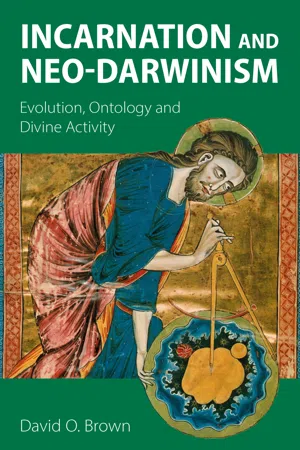Bibliography
Aghiorgoussis, M., 1992, “Orthodox Soteriology”, in Meyendorff, J. and Tobias, R. (eds), Salvation in Christ: A Lutheran–Orthodox Dialogue, Minneapolis, MN: Augsburg Fortress Press.
Agourides, S., 1964, “The Social Character of Orthodoxy”, in Philippou, A. (ed.), The Orthodox Ethos: Studies in Orthodoxy Vol. 1, Oxford: Holywell Press.
Aletti, J., 2002, “Romans 8: The Incarnation and its Redemptive Impact”, in Davis, S., Kendall, D. and O’Collins, G. (eds), The Incarnation, Oxford: Oxford University Press.
Allchin, A., 1988, Participation in God, London: Darton, Longman & Todd.
Anderson, R., 1986, Theology, Death & Dying, Oxford: Basil Blackwell.
Anderson, R., 1998, “On Being Human: The Spiritual Saga of a Creaturely Soul”, in Brown, W., Murphy, N. and Malony, H. N. (eds), Whatever Happened to the Soul: Scientific and Theological Portraits of Human Nature, Minneapolis, MN: Augsburg Fortress Press.
Anon., 1961, The Cloud of Unknowing and Other Works, Harmondsworth: Penguin Books.
Anselm of Canterbury, 1998, Anselm of Canterbury: The Major Works, Oxford: Oxford University Press.
Aquinas, T., 1948, Summa Theologica Vol. 4, New York: Benziger Brothers.
Aquinas, T., 1998, Selected Writings, London: Penguin Classics.
Athanasius, 1954, Christology of the Later Fathers, London: Westminster John Knox Press.
Augustine of Hippo, 1991, Confessions, Oxford: Oxford University Press.
Augustine of Hippo, 1991a, The Trinity, Hyde Park, NY: New City Press.
Aulén, G., 1931, Christus Victor, London: SPCK.
Ayala, F., 1998, “Human Nature: One Evolutionist’s View”, in Brown, W., Murphy, N. and Malony, H. N. (eds), Whatever Happened to the Soul: Scientific and Theological Portraits of Human Nature, Minneapolis, MN: Augsburg Fortress Press.
Ayres, L., 2004, Nicaea and its Legacy, Oxford: Oxford University Press.
Barbour, I., 1971, Issues in Science and Religion, New York, NY: Harper Torchbook.
Barbour, I., 2001, “God’s Power: A Process View”, in Polkinghorne, J. (ed.), The Work of Life: Creation as Kenosis, Cambridge: William B. Eerdmans.
Barclay, J., 1996, “The Resurrection in Contemporary New Testament Scholarship”, in D’Costa, G. (ed.), Resurrection Reconsidered, Oxford: Oneworld.
Barron, R., 2007, The Priority of Christ: Towards A Postliberal Catholicism, Grand Rapids, MI: Brazos Press.
Barron, R., 2015, Exploring Catholic Theology, Grand Rapids, MI: Baker Academic.
Barron, R., 2016, Vibrant Paradoxes, Skokie, IL: World On Fire.
Barton G., 1934, Christ and Evolution: A Study of the Doctrine of Redemption in the Light of Modern Knowledge, Philadelphia, PA: University of Pennsylvania Press.
Bathrellos, D., 2004, The Byzantine Christ: Person, Nature, and Will in the Christology of St. Maximus the Confessor, Oxford: Oxford University Press.
Behe, M., 1998, Darwin’s Black Box, New York, NY: Simon & Schuster.
Bernard, G., 2011, Living Consciousness: The Metaphysical Vision of Henri Bergson, New York, NY: SUNY Press.
Berry, R. J., 1982, Neo-Darwinism, London: Edward Arnold Limited.
Bettenson, H. and Maunder, C. (eds), 1999, Documents of the Christian Church, Oxford: Oxford University Press.
Bianchi, E., 1998, Praying the Word of God, Kalamazoo, MI: Cistercian Publications.
Birdsell, J. and Wills, C., 2003, “The Evolutionary Origin and Maintenance of Sexual Reproduction: A Review of Contemporary Models”, Evolutionary Biology Vol. 33
Birx, H., 1972, Teilhard de Chardin’s Philosophy of Evolution, Springfield, IL: Charles C. Thomas.
Birx, H., 1991, Interpreting Evolution: Darwin & Teilhard de Chardin, New York, NY: Prometheus Books.
Boethius, 2000, The Consolation of Philosophy, Oxford: Oxford University Press.
Boff, L., 1997, Cry of the Earth, Cry of the Poor, Maryknoll, NY: Orbis Books.
Bonaventure, 1978, Bonaventure: The Soul’s Journey to God, The Tree of Life, The Life of St. Francis, Mahwah, NJ: Paulist Press.
Brown, D., 1985, The Divine Trinity, London: Duckworth.
Brown, R., 1973, The Virginal Conception and The Resurrection of the Body, New York, NY: Paulist Press.
Brown, W., 1998, “Cognitive Contributions to Soul”, in Brown, W., Murphy, N. and Malony, H. N. (eds), Whatever Happened to the Soul: Scientific and Theological Portraits of Human Nature, Minneapolis, MN: Augsburg Fortress Press.
Burggren, W., 2014, “Epigenetics as a Source of Variation in Comparative Animal Physiology—Or—Lamarck is Lookin’ Pretty Good These Days”, Journal of Experimental Biology 217 (5).
Burns, J., 1981, Theological Anthropology, Philadelphia, PA: Fortress Press.
Bynum, W., 2009, “Introduction”, in Darwin, C., On the Origin of Species, London: Penguin.
Cabasilas, N., 1974, The Life in Christ, Crestwood, NY: St Vladimir’s Seminary Press.
Canale, F., 2009, Creation, Evolution, and Theology: An Introduction to the Scientific and Theological Methods, Santa Rosa, Argentina: Universidad Adventista del Plata Editorial.
Carey, N., 2012, The Epigenetics Revolution, London: Icon Books.
Cary, P., 2000, Augustine’s Invention of the Inner Self: The Legacy of a Christian Platonist, Oxford: Oxford University Press.
Castelli, E., 1991, Imitating Paul: A Discourse of Power, Louisville, KX: Westminster/John Knox Press.
Cavanaugh, W., 1999, “Beyond Secular Parodies”, in Milbank, J., Pickstock, C. and Ward, G. (eds), Radical Orthodoxy, Abingdon: Routledge.
CCC, 1997, Catechism of the Roman Catholic Church, Vatican City: Libreria Editrice Vaticana.
Chia, R., 2011, “Salvation as Justification and Deification”, Scottish Journal of Theology 64:2.
Chown, M., 2014, “The Big Bang”, in Webb, J. (ed.), Nothing, London: Profile Books.
Clement of Alexandria, 1969, “Protrepticus”, in Bettenson, H. (ed.), The Early Christian Fathers, Oxford: Oxford University Press.
Coakley, S., 2001, “Kenosis: Theological Meanings and Gender Connotations”, in Polkinghorne, J. (ed.), The Work of Life: Creation as Kenosis, Cambridge: William B. Eerdmans.
Coakley, S., 2002, “What Does Chalcedon Solve and What Does it Not? Some Reflections on the Status and Meaning of the Chalcedonian ‘Definition’”, in Davis, S., Kendall, D. and O’Collins, G. (eds), The Incarnation, Oxford: Oxford University Press.
Cole-Turner, R., 1993, The New Genesis: Theology and the Genetic Revolution, Louisville, KX: Westminster/John Knox Press.
Collins, F., 2007, The Language of God, London: Pocket Books.
Collins, G., 2010, Meeting Christ in His Mysteries, Dublin: Columba Press.
Conee, E. and Sider, T., 2005, Riddles of Existence, Oxford: Clarendon Press.
Cooper...
